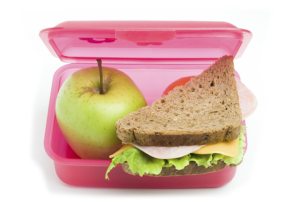Don’t pack food poisoning bugs in your lunchbox – back to work and school food safety warning
Media release: 17 January 2014
Choose, Clean and Chill – three key actions vital for healthy, food safe lunchboxes according to the Food Safety Information Council.
Council Chair, Dr Michael Eyles, said Council research shows that four out of five adults and almost all children take packed lunches to work or school, but not all are following basic tips to ensure the food is safe when eaten.
Dr Eyles said packed lunches are great for healthy eating but we need to be extra careful when packing and transporting food to work or school to ensure we don’t become one of the estimated 5.4 million cases of food poisoning in Australia each year.
“Firstly, choose a lunchbox which is easy to clean and provides space for a frozen drink or freezer block to help keep perishable food cold, as most lunches are eaten four or more hours after leaving home,” he said.
“ Also critical is choosing low risk foods such as hard cheeses, freshly cooked meats and poultry, fresh, well-washed fruits and vegetables, canned tuna or salmon, shelf stable snacks and sandwich spreads.
“Lunches can safely be prepared a little ahead of time provided they are kept in the fridge or frozen to prevent the growth of food poisoning bacteria. Food which may drip should be in airtight containers or wrapped well. Pack perishable foods such as cheeses and sandwiches nearest the frozen drink or freezer block.
“Lunchboxes kept inside the school bag will keep cooler longer especially if the bag is away from heat sources such as direct sunlight.
“At work put food in the fridge as soon as you arrive or, if working on construction sites, outdoors or other environments with limited access to refrigerators, pack food in insulated containers with frozen drinks or freezer bricks and place the container in a cool place between meal breaks.
“Staff fridges should be uncrowded and running at or below 5°C. Provide labels and a pen so people can label and date any food they put in the fridge.
“Warn children against sharing drink bottles. Sharing lunches is also not a good idea as it is difficult to know what allergies other children may have, or whether the foods have been prepared using the basic food safety tips.
“Finally, if you or your child has food poisoning don’t go to work or school, and avoid handling food for others for 48 hours after symptoms such as vomiting and diarrhoea stop. If food poisoning symptoms persist, visit a doctor,’ Dr Eyles concluded.
Other lunchbox tips:
- When preparing food, always practice scrupulous hand washing and ensure cutting boards, benches and utensils are clean and dry.
- Wash all fruits and vegetables thoroughly.
- When buying lunchboxes choose ones which are easy to clean and dry. Insulated lunchboxes are a great idea, but not if they are difficult to keep clean.
- Lunchboxes and reusable drink bottles must be thoroughly washed and dried daily. If cracked, split or crazed, replace as bugs love hidey holes.
- Make sure lunch foods are cooked properly in the first place.
- Divide cooked leftovers into small lunch-sized portions so they refrigerate or freeze quickly.
- When reheating, make sure they are steaming hot all the way through – stir or turn food as appropriate.
- Make sure lunchbox foods are always well separated from other foods in the refrigerator, particularly raw meats, chicken and fish, the juices of which will contaminate foods such as fruit and salad vegetables which won’t be cooked before adding to the lunchbox.
- Use refrigerated leftovers saved for lunches within 3 days − if in doubt throw it out!
- With a staff kitchen at work, set up a roster to ensure bench tops are clean and dish cloths, sponges, brushes and tea towels are clean and replaced regularly. Wash dirty dishes in hot soapy water or put in the dishwasher.
For more information see work and school lunchbox safety and for healthy lunchbox ideas see the Dietitians Association of Australia
Food poisoning results, on average, in 120 deaths, 1.2 million visits to doctors, 300,000 prescriptions for antibiotics, and 2.1 million days of lost work each year. The estimated annual cost of food poisoning in Australia is $1.25 billion.
The Food Safety Information Council is Australia’s leading disseminator of consumer targeted food safety information. It is a non-profit entity supported by the Australian Department of Health, state and territory health and food safety agencies, local government, and leading professional, industry and community organisations.
Contact:
Juliana Madden, Food Safety Information Council Executive Officer,
Tel 0407 626 688 info@foodsafety.asn.au

